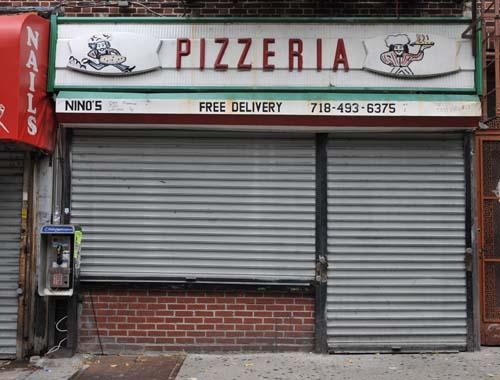Nearly half of the ‘dirty dozen’ — considered the filthiest eateries in the city — can be found in Brooklyn, a state lawmaker announced this week.
Mice, insects—both flying and crawling—and a host of other gut-churning conditions were found at the five borough restaurants detailed by State Senator Jeff Klein.
At Nino’s Pizza, 842 Franklin Avenue, inspectors visiting in late July found flying insects, roaches and mice—among a range of violations.
Anthony Andujar, the owner of Nino’s, said his restaurant has already felt the impact of the report, which was picked up by local television and radio stations..
“I had a packed place this morning and everyone walked out,” Andujar said.
Over the summer, he said, the restaurant was closed for about a month while he renewed his license to operate. Right after he reopened, inspectors visited, and found mouse droppings and maybe “one dead roach.”
“It was old stuff. There was nothing that dangerous,” he added. “They found a couple of little things.”
Andujar said the restaurant, which ash been a neighborhood staple for the past 35 years, recently upgraded its equipment. “Everything was a little old.”
He expressed confidence that customers—many whom literally grew up on Nino’s pizza—would return.
The report studied a subset of New York City’s 20,000 restaurants with the 100 worst inspection reports compiled by the Department of Health (DOH), with violation point scores ranging from 69 to 600.
Of the bottom 100 restaurants, 87 percent had at least one category of pest cited in their most recent inspection.
“Restaurant discipline and the commitment to proper sanitation and food safety have clearly broken down when an establishment finds itself juggling multiple pest infestations,” said Klein, who represents the Bronx and Westchester.
“Whether New Yorkers are dining out for a routine meal or to celebrate a special occasion, their only reservations should be to book a table,” he added.
Of the bottom 100 restaurants, 87 percent had at least one category of pest cited in their most recent inspection.
Restaurants with the most hazardous conditions, or a series of failed inspections, are ordered closed by the Department of Health until they can pass an inspection and safely reopen, Klein stated.
Almost half, or 45 percent, of those restaurants had at least two categories of pests cited and 12 percent were cited for three separate categories of pest violations.
The remaining four Brooklyn restaurants on the list include: Golden Krust Caribbean Bakery, 1862 Nostrand Avenue; Café Carciofo, 248 Court Street; Action Burger, 513 Grand Street; and Merry Jerry’s Jamaican Restaurant, 102 Saratoga Avenue.
At Golden Krust, inspectors found—among a laundry list of violations—inadequate personal cleanliness, flying insects, spoiled food, mice, and that the eatery was not vermin proof.
In a statement, the Bronx-based company said the Nostrand Avenue restaurant has been closed since July, “in an effort to conduct the necessary equipment and store renovations to meet Golden Krust standards and New York City health and safety requirements.”
“This restaurant will not be re-opened until Golden Krust Corporate determines that the store meets compliance standards,” the statement reads.
“Golden Krust Corporate is treating this situation very seriously and will be heightening its internal health and safety monitoring procedures to ensure that all restaurants within the chain are adhering to the most stringent cleanliness and food safety standards.”
There are 90 Golden Krust restaurants throughout the tri-state area, according to the company.
Candice Richards, a spokesperson for Golden Krust, said each store is individually owned. She said she did not know why sanitary conditions were able to degrade at the Nostrand Avenue location.
She offered no timetable for the restaurant’s reopening.
Both Café Carciofo and Action Burger are both closed. Merry Jerry’s could not be reached at press time.
Klein said he is sponsoring legislation that would require restaurants to post a letter grade of A through F commensurate with their standing.
“Having a letter grade posted for all diners to see will provide a real incentive for restaurants to clean up their act”, said Klein. “I can’t imagine anyone wanting to eat at an establishment with an ‘F’ hanging in the doorway,” he continued.
The DOH has said it is “open to new ideas” for keeping consumers informed about restaurant cleanliness.
Klein also released a list of the cleanest restaurants, which he called “The Sparkling 12.” Not a single eatery from Brooklyn can be found on that enviable list.























